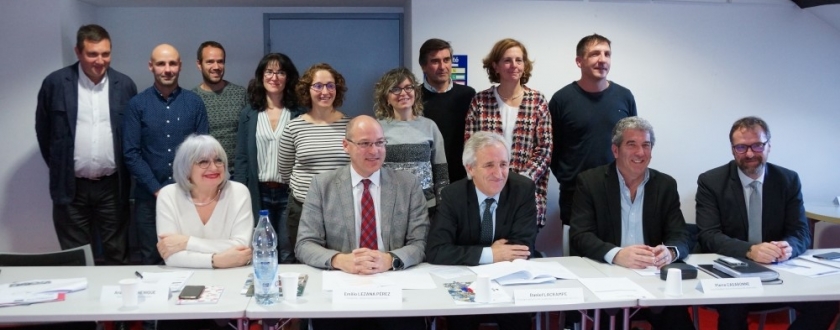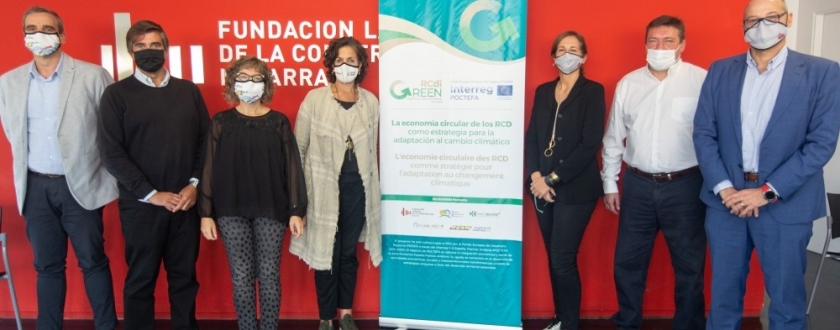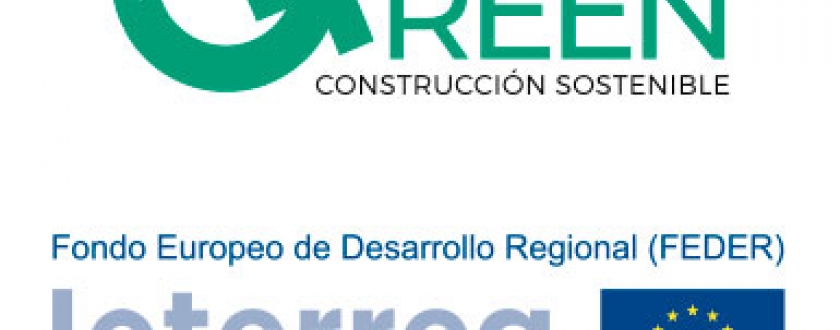RCdiGREEN The circular economy of Construction and Demolition Waste (CDW) as a climate change adaptation strategy
Description of the case study
In the Navarre and Pyrénées-Atlantiques region, valuing CDW has become a strategic objective of the Administration and the construction industry due to its direct impact on a sustainable economy.
The lack of raw materials, problems opening new dumps, strict regulations for extraction industry operations, and strategic support for building renovation in order to adapt them to demands derived from new social and energy needs have made CDW recovery appear as a clear solution to a raw material problem for many actions, including those with the aim of refurbishing run-down spaces. The construction industry is the main consumer of materials and producer of waste (more than 90% is inert).
Action 1. Developing studies, inventories, and identifying requirements around CDW use and practical application.
Action 2. Designing and developing a construction and demolition waste recovery strategy, as well as its use. Applying methodologies to implement climate change adaptation with circular criteria.
Action 3. Practical application and evolution of the strategies designed.
Action 4. Conclusions, knowledge transfer, permanence over time.
Overall goal: establishing a sustainable construction and demolition waste recovery strategy, taking into account its contribution to alleviating the effects of climate change.
Specific objectives:
» Developing measures relating to the circular economy in construction based on climate change adaptation through the use of CDW.
» Recovering and using CDW in construction.
» Practical application and evaluation of the environmental benefits in cross-border spaces associated with the use of CDW, taking into account the new risk management and climate change measures.
Establishing a cross-border strategy to implement an efficient CDW strategy, in which the circular economy must constitute a cornerstone for climate change adaptation. Having a real starting point from which a strategy is designed has been discussed, taking into account everything mentioned and with pilot experiences being developed to validate them.
Taking the cross-border Navarre and Aquitaine region as a space, the following actions and reports are established for the project during its development:
» Worktables.
» Awareness-raising conferences.
» Developing studies, inventories, and identifying requirements around CDW use and practical application.
» Designing a construction and demolition waste recovery strategy, as well as its use.
» Practical application and evolution of the strategies designed.
» Transferring knowledge through conventions, events, etc.
Case study developed, implemented, and partly funded as a climate change adaptation measure.
Communauté de communes de Haut Béarn, NOBATEK INEF4 (France), the Navarre Construction Labour Foundation, Gestión Ambiental de Navarra S.A. (GAN-NIK), and Recuperación Ambiental, S.L. (Spain). Partners: The Government of Navarre, Valor Béarn, and TECNALIA.
Additional Information
Throughout the project, the hope is to involve all construction and demolition waste value chain stakeholders to detect problems in management, and find strategies to alleviate them. The Department of Rural Development and Environment collaborates jointly throughout the project and carries out panel discussions and awareness-raising conferences, where agents, construction associations, local entity associations, universities, other departments of the Government of Navarre, and French associations such as Syndic Valor Héarn, Cearn, etc. are invited to participate. The results of these panel discussions are discussed with the partners to attempt to look for solutions on both sides of the border.
A key to this project’s success is that it is fully integrated into the strategies of both territories in terms of climate change adaptation, the circular economy, and carbon footprint calculations. Also, an agreement between the project’s partners will be signed after finishing the programme to continue developing the strategy.
However, there are similar limiting factors on both sides of the border that are slowing strategy development:
1. Territorial development is not equitable, with less populated areas being those with the greatest management issues and those requiring a tailored strategy.
2. The large number of agents involved in the value chain make it difficult for the project to spread equally to everyone.
3. In general, the construction sector is reluctant to change, so their incorporation tends to be slow and costly.
The project has a total budget of €1,045,000.43. The GAN-NIK budget is €283,944.77, and is 65% financed by FEDER.
Belonging to the INTERREG V Programme for Spain-France-Andorra (POCTEFA) 2014-2020, within the framework of its third round.
10/01/2019 - 5/31/2022 (3 years - in progress)
Reference information
PYRENEAN CLIMATE CHANGE OBSERVATORY
Avenida Nuestra Señora de la Victoria, 8
22.700 - Jaca
Huesca - España
+34 974 36 31 00
info_opcc@ctp.org







